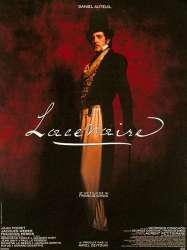Films with theme "Films about capital punishment", sorted by revenue

The Hoodlum Priest (1961)
, 1h41Directed by Irvin Kershner
Origin USA
Genres Drama, Biography
Themes Prison films, Films about religion, Films about capital punishment
Actors Don Murray, Larry Gates, Keir Dullea, Logan Ramsey
Father Charles Dismas Clark, a Jesuit priest in St. Louis, dedicates his life to the rehabilitation of delinquents and ex-convicts. By meeting them on their own terms and talking their language, he wins their confidence and their trust. He is primarily concerned with a young thief, Billy Lee Jackson, recently released from the Missouri State Penitentiary. Father Clark helps clear the boy of some trumped-up charges and then gets him an honest job with a produce market. Billy's rehabilitation is further encouraged by Ellen Henley, a young socialite with whom he falls in love. Meanwhile, aided by Louis Rosen, a successful criminal lawyer, Father Clark raises enough funds to open Halfway House, a shelter for ex-convicts readjusting to civilian life. All goes well until Billy's employer fires him for a theft he did not commit. Embittered, he and a friend, Pio, attempt to rob the produce market. They are caught by one of the owners, and he attacks Billy with a crowbar. The panic-stricken boy grabs a gun and kills him. The police chase Billy to an abandoned house, and he hides there until Father Clark persuades him to surrender. Tried and convicted of murder, he is sentenced to death. Before Billy dies in the gas chamber, Father Clark reassures him by telling him of Dismas, the thief who died on the cross, and of how Christ promised him eternal life. After the execution, Father Clark returns to Halfway House and finds his first client, Pio, drunk and repentant.
 , 6h40
, 6h40Directed by Josée Dayan
Genres Drama, Historical
Themes Prison films, Films about capital punishment
Actors Gérard Depardieu, Ornella Muti, Jean Rochefort, Pierre Arditi, Guillaume Depardieu, Michel Aumont
Edmond Dantès is falsely accused of Bonapartism and sentenced to spend the rest of his life imprisoned in the dreaded Château d'If, an island fortress from which no prisoner has ever escaped, and to which the most dangerous political prisoners are sent. While imprisoned, he meets Abbé Faria, a fellow prisoner whom everyone believes to be mad. Abbé tells Edmond of a fantastic treasure hidden away on a tiny island, that only he knows the location of. After many years in prison, the old Abbé dies, and Edmond escapes disguised as the dead body to find the treasure Abbé told him of, so he can use the new-found wealth to exact revenge on those who have wronged him.

Everyone Dies Alone (1976)
, 1h42Directed by Alfred Vohrer
Origin German
Genres Drama, War, Thriller
Themes Political films, Films about capital punishment
Actors Hildegard Knef, Carl Raddatz, Peter Matić, Heinz Reincke, Alexander Radszun, Rudolf Fernau
The film takes place in Berlin in 1940, during World War II as Adolf Hitler is at the height of his power. Anna and Otto Quangel, a working class couple, live in Berlin in simple circumstances and are not particularly interested in politics. Then, their only son is killed in action during the Battle of France and as they grieve for their son, the desire to resist the Nazi regime grows within them. When a Jewish neighbor is also killed, Anna decides to actively join the German Resistance. She begins writing very personal flyers on postcards, which she at first alone, and then with her husband, leaves in public places and slips into mailboxes. The two are discovered and are arrested and eventually sentenced to death. Otto Quangel commits suicide in the courtroom with a cyanide pill; his wife is executed two months later.

The Impostor (1944)
, 1h30Directed by Julien Duvivier
Origin USA
Genres Drama, War
Themes L'usurpation d'identité, Political films, Films about capital punishment, Escroquerie
Actors Jean Gabin, Ellen Drew, Richard Whorf, Dennis Moore, Ralph Morgan, Peter van Eyck
Clement (Gabin), a condemned murderer literally minutes away from the guillotine, is "liberated" when the Nazis bomb the French jail that holds him. During his escape he steals the uniform and identification papers of a dead French soldier. He then hides from the law by joining the Resistance movement. Clement's new identity and purpose in life reform him. In the end he sacrifices himself in service of his country.

The Elegant Criminal (1990)
, 2h5Directed by Francis Girod
Origin France
Genres Drama
Themes Films about writers, Prison films, Films about capital punishment
Actors Daniel Auteuil, Jean Poiret, Jacques Weber, François Périer, Geneviève Casile, Jean Davy
Dans une cellule, Pierre François Lacenaire vit ses derniers jours en attendant la guillotine. Il reçoit divers visiteurs : son ami intime et complice, Avril, deux phrénologues venus étudier le crâne d'un grand criminel, sa maîtresse Ida, l'écrivain et journaliste Arago, le chef de la Sûreté Allard, avec lesquels il évoque son étrange destinée. Enfant, il a souffert du manque d'amour d'une mère qui préférait son frère. Il découvre peu à peu le chemin du mal. Parti de petits larcins, c'est à l'armée qu'il franchit le pas du meurtre en se vengeant d'un tricheur, il est incarcéré pour escroqueries et en profite pour y recruter des hommes de main, dont Avril et le jeune et naïf Baton. Avec ceux-ci, il monte des coups de plus grande envergure.

Die Stunde der Offiziere (2004)
, 1h30Genres Drama, War, Biography, Documentary, Historical
Themes Political films, Films about capital punishment
Actors Bastian Trost, Klaus Johannes Behrendt, Tilo Prückner, Hermann Lause, Axel Pape, Tom Wlaschiha
On 13 March 1943, Henning von Tresckow puts a bomb on Hitler's plane, but the bomb fails to explode. On 21 March 1943, Rudolf Christoph von Gersdorff intends a suicide bombing attack on Hitler in an exhibition, yet Hitler leaves prematurely. A similar attempt by Axel von dem Bussche fails as the event is canceled due to allied air raid on Berlin.

All for the Moral Majority! (1984)
, 1h50Directed by Alberto Sordi
Origin Italie
Genres Drama, Comedy
Themes Prison films, Films about capital punishment
Actors Alberto Sordi, Dalila Di Lazzaro, Joe Pesci, Giorgia Moll, Armando Francioli, Tino Bianchi
The judge Annibale is an incorruptible magistrate of Rome which, although close to retirement, does not intend to show any sign of weakness. He continues his severe work and continues feeding without pity all the poor people that comes within range, including of course the criminals. All his colleagues admire him, including his girlfriend with whom he is to marry. But also an honest judge and moralist like Annibale has secrets. In fact he, in addition to his life full of lies and worldliness, has entered into an agreement with an American mafia boss: Corrado Parisi. In fact, Annibale was forced against his will to accept the assignment to not send to jail the whole company of the boss, who is preparing a shady traffic. Annibale eventually tries to rebel, but can not make it in time for the television journalists discover it. Comments are added to the scandal of the best friends of Annibale and his esteemed colleagues of the court immediately condemn him as the worst of all parasites. The life of Annibale is destroyed in one fell swoop.

Le Pantalon (1997)
Directed by Yves Boisset
Origin France
Genres Drama, War
Themes Prison films, Films about capital punishment
Actors Wadeck Stanczak, Philippe Volter, Bernard-Pierre Donnadieu, Jean-Paul Comart, Marie Verdi, Riton Liebman
Depuis octobre 1914, la première guerre mondiale s'enlise dans la guerre de position sur le front de l'ouest. Fantassin au 60e Régiment d'infanterie, Lucien Bersot, maréchal-ferrant et jeune père de famille, fait son devoir de citoyen au front. Il attend impatiemment sa prochaine permission pour revoir sa famille. Mais le destin, sous la forme d'un pantalon en a décidé autrement. En effet, au moment de s'équiper avant l'arrivée au front, on lui attribue un pantalon de treillis blanc, au lieu du pantalon garance de l'uniforme de l'armée française, car il n'y en avait plus à sa taille. Lors de la revue de troupe, un officier exige qu'on lui octroie un pantalon réglementaire, or celui que le sergent fourrier lui propose est taché de sang, déchiré, car il provient d'un cadavre. Bersot refuse de le porter. Ce refus d'obéissance lui vaut d'être interné jusqu'à son passage en cour martiale. Deux camarades de Lucien Bersot, se dressent contre cette injustice et en informent le colonel. Celui-ci ayant appris que des soldats défaitistes déserteraient dans les tranchées veut faire un exemple. L'entrevue tourne au malentendu et les deux soldats sont enfermés eux aussi. Le procès qui s'ensuit est à sens unique car le colonel qui préside la cour abuse de son pouvoir. Celle-ci condamne les frères d'armes de Lucien Bersot aux travaux forcés et ce dernier à la peine capitale. Le défenseur du pauvre soldat le lieutenant Guérin, l'ayant vu combattre, tente de le sauver en allant demander la grâce du général. Malheureusement l'artillerie ennemie pilonne le chemin qui y conduit et voue cette tentative à l'échec. Le soldat Bersot est fusillé le lendemain à l'aube pour l'exemple devant les nouvelles recrues et le reste de ses camarades.

Directed by Denys Granier-Deferre
Genres Drama
Themes Prison films, Films about capital punishment
Actors Catherine Frot, Didier Flamand, Cyril Descours, Hervé Briaux, Yves Verhoeven, Julien Tortora
Le 5 juin 1974 Christian Ranucci, vingt ans, est interpellé à son domicile. Officiellement pour un délit de fuite après un accrochage qui a eu lieu deux jours plus tôt. En fait, il est soupçonné d'avoir enlevé la petite Maria Dolores Rambla, huit ans, et de l'avoir sauvagement assassinée. Un geste atroce, qui scandalise la France entière. En garde à vue, le petit frère de la victime ne reconnaît pas Christian Ranucci. Pas plus qu'un couple témoin de l'accident. Après dix-huit heures d'interrogatoire, le jeune homme passe aux aveux, puis se rétracte et fait état des pressions que les enquêteurs lui ont fait subir. Il est vrai qu'il subsiste de nombreuses zones d'ombre. En outre, certains détails ne collent pas. Pourtant, seule la mère de l'accusé, Héloïse Mathon, croit en son innocence. Le procès s'ouvre dans un climat tendu, quelques semaines après un autre meurtre d'enfant. Face à une opinion déchaînée, Héloïse fait front. Elle décide de tenter tout ce qui est en son pouvoir pour sauver son fils, qui sera condamné à mort et guillotiné, le président de la République ayant refusé de le gracier.
 Connection
Connection